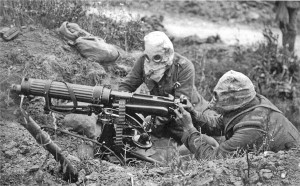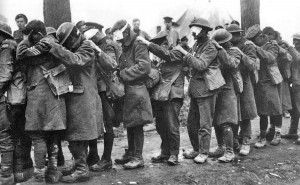Wars often change and reshape religions. I have posted recently, for instance, on how the chaos of war can stir apocalyptic expectations and fears, and spawn new religious movements.
War can also have a powerful effect on theology, on how they see the church’s role. Historically, churches have repeatedly discredited themselves by their uncritical acceptance of official state positions, especially when later events have shown the hollowness of those political beliefs.
Now, historians often exaggerate the speed of these effects, which rarely occur overnight. The incredible bloodshed of the Thirty Years War ended in 1648, but still thirty and forty years later, plenty of Europeans still interpreted politics in a mystical and apocalyptic strain. Yet having said that, the end of that war did undoubtedly mark a shift to more rational and secular approaches to religion. If it did not conquer Europe overnight, the Enlightenment was certainly under way by the 1660s.
The First World War, likewise, did not overnight create massive popular disenchantment with religion: religious politics still boomed through the 1920s. But that war too sparked a rethinking of theology, a fundamental questioning of long-familiar attitudes to the proper relationship of church and state.
In 1914, most European churches were still closely tied to empires and nation-states, and they wholeheartedly espoused a Holy War rhetoric, most notoriously in Germany and Russia. All Germany’s major thinkers and theologians happily signed outrageous statements of jingoistic nationalist propaganda. This in turn led to a horrified reaction, initially among a few prophetic souls, but soon reaching wider audiences.
Part of this story has been often retold. In October 1914, Germany’s theologians put their names to a controversial Manifesto that presented their nation’s cause to the world of learning and culture. The list even included such luminaries as Adolf von Harnack and Wilhelm Herrmann. Among its horrified readers was Karl Barth, then a young pastor in neutral Switzerland. Reading the signatories of that document,
I discovered almost all of my theological teachers whom I had greatly venerated. In despair over what this indicated about the signs of the time I suddenly realized that I could not any longer follow either their ethics and dogmatics or their understanding of the Bible and of history. For me at least, nineteenth century theology no longer held any future.
For Barth and like-minded critics, questions naturally presented themselves: when those great Christian scholars signed those propaganda statements, how did they differentiate themselves from any other super-patriotic bourgeois of the time? How exactly did the kingdom of God that they preached relate to worldly states, to empires and kingdoms? The theologies that emerged from the ensuing debates shaped Christian responses to war and the state through the end of the century, and beyond.
Seeking to answer these questions, Barth proposed a radical separation between God, the absolutely holy, and a world that could, with all the best intentions, could never rise unassisted beyond its sins and failures. God was Wholly Other, and resisted any idolatrous attempt to enlist his name to the cause of any worldly state or empire.
Barth also began a re-reading of the Bible, in a manner quite different from the scholarly detachment of the academics. It was in 1916 – the year of the Battles of the Somme and Verdun – that he began his intense two year study of Paul’s Letter to the Romans. When the book’s second edition appeared in 1922, it “burst like a bombshell on the playground of the European theologians.”
Often, ideas that might seem daring or even revolutionary to theologians and philosophers have little impact on a wider public. In the case of Barth and his circle, though, his influence went far beyond the academy, or the churches, and had sweeping political implications into the 1960s and beyond. We find it in such theologians as Rudolf Bultmann, Paul Tillich and Emil Brunner. Although I will not describe this in detail here, the war also transformed the attitudes of such prominent Catholic thinkers as Henri de Lubac, Étienne Gilson, and Jacques Maritain.
Through most of the twentieth century, Western theology was profoundly influenced by the events of the First World War. The echoes of Verdun and the Somme still resonate today.
Incidentally, this material is drawn from my forthcoming book The Great and Holy War, to be published by HarperOne in May 2014.














